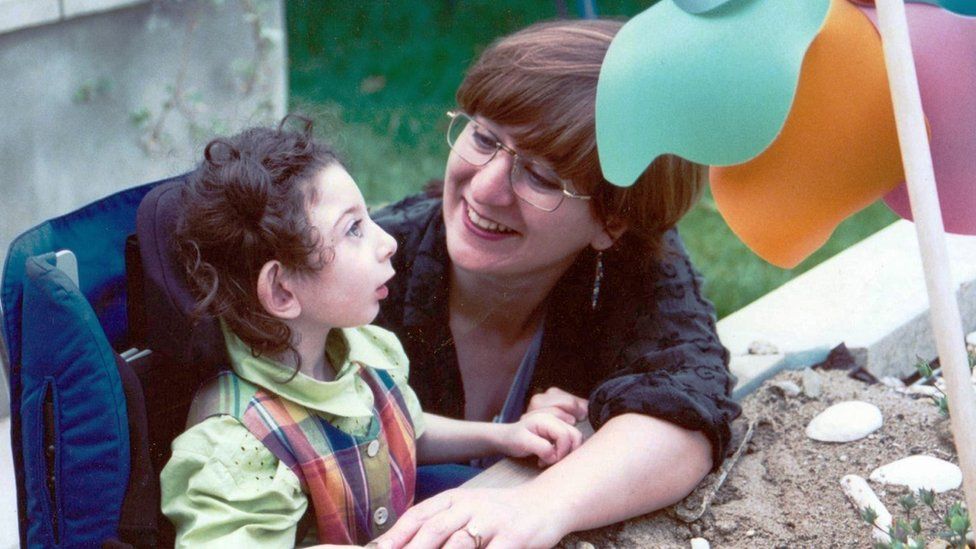
Sheila Brill has now written a book about her daughter called ‘Can I speak to Josephine, please?’
By Rachel Candlin & Caz Milford
BBC News, West of England
A mother whose daughter was severely disabled due to medical negligence at birth has spoken of how she was told it “might be better if she didn’t survive”.
Sheila Brill, from Westbury-on-Trym, Bristol, gave birth to her daughter Josephine in London in 1993.
But during the labour, her daughter was starved of oxygen, which led to a catastrophic brain injury. She died in 2016, aged 23.
Mrs Brill has now become an unintentional campaigner for safer childbirth and has written a book about her experience.
“I instantly knew something was wrong,” Mrs Brill said.
“She was taken away to be resuscitated and the first time I saw her, she was in an incubator in intensive care.
“There were tubes everywhere and I couldn’t touch her.
“I was told by the obstetrician after Josephine’s birth, that it might be better if she didn’t survive.”
Image source, Sheila Brill
Josephine was starved of oxygen when she was born in 1993, leading to a catastrophic brain injury
Mrs Brill said there were a number of issues which culminated in Josephine being starved of oxygen.
Among them was the fact she was induced on a post-natal ward and the cardiotocography (CTG) – a record of the fetal heart rate and uterine contractions – was poorly interpreted by a registrar.
The consultant obstetrician also failed to return to the ward to monitor her progress in labour.
The situation for Mrs Brill and her husband Peter was made more difficult because her father-in-law was a GP and fellow of the Royal College of Obstetricians and Gynaecologists (RCOG), who had delivered hundreds of babies during a long medical career.
“I’ve very rarely seen my father cry,” said Mr Brill.
“These people were colleagues of my father, who had set up a unit in that hospital.
“He was facing not just watching his granddaughter with all these medical issues, but realising that he’d been let down by his own profession.”
The medical negligence case against the health trust was settled in February 2000, more than six years after Josephine’s birth.
During her life, Josephine was unable to ever walk or speak and suffered frequent spasms due to cerebral palsy.
The out-of-court settlement enabled the family to give her the best medical care available.
Image source, Sheila Brill
Mr Brill said his father faced realising he had been let down by his own profession
However, she was barely able to communicate, with only her hearing fully functioning.
“It was almost impossible to physically comfort her,” said Mrs Brill.
“It was really hard to mother or father her and the reality was that a lot of our time we felt we were carers, we had to be, and that’s OK, that’s what was required.”
Mr Brill added: “When Josephine’s health was clearly failing, a clinician said ‘there’s not much more we can do now, we just need you to be Mum and Dad’ and Sheila and I looked at each other and thought, ‘how do we do that?'”
Mrs Brill sought help for post-traumatic stress disorder 20 years after the traumatic birth and started attending a writing course after Josephine died.
“I originally started writing to have my story witnessed. I realised it needed to be out there,” she said.
Image source, Sheila Brill
Mr Brill said they felt like carers for much of Josephine’s life
She has now written a book, Can I speak to Josephine, please?, which was published in March.
The story of a survivor of birth trauma, it portrays the trials and challenges but also the joyful moments of bringing Josephine up.
“I thought just friends and family would read my book, but I’ve unintentionally tapped into a wider campaign for safer childbirth,” she said.
“Damning reports on the mismanagement of childbirth and the lack of accountability… made me realise that my story had its place in the fight to improve maternity services.”
At the launch event for the book, the president of RCOG said she believed it should be required reading for all obstetricians.
“It seems that in writing the book, I have become part of a growing campaign to improve maternity safety across the UK,” Mrs Brill said.
“I didn’t expect to become a campaigner, but if this results in lasting, positive change, then that will be Josephine’s legacy.”
Image source, Sheila Brill
Mrs Brill’s book portrays the trials, challenges and joyful moments of bringing up Josephine
If you’ve been affected by the issues in this story, help and support is available via the BBC Action Line
Follow BBC Bristol on Facebook, X and Instagram. Send your story ideas to us on email or via WhatsApp on 0800 313 4630.








